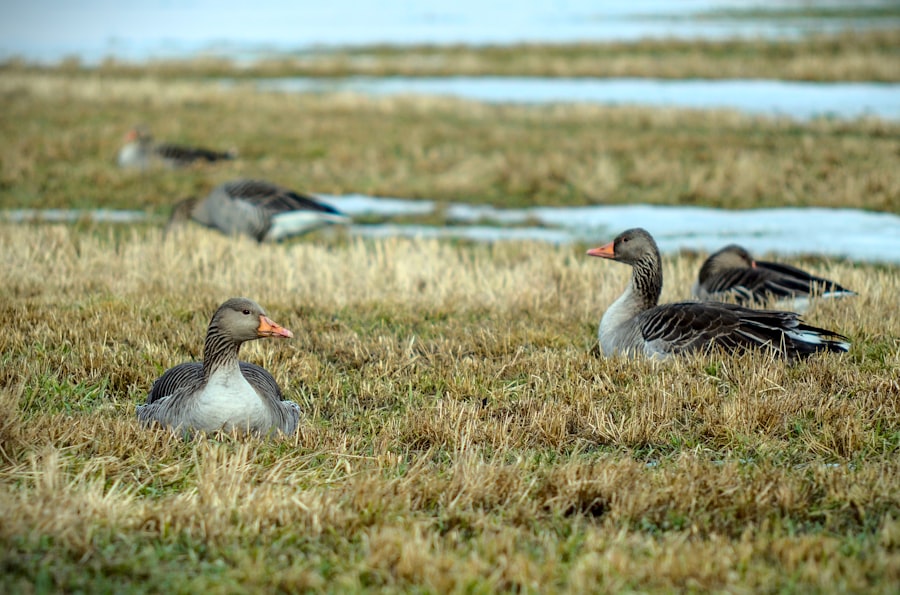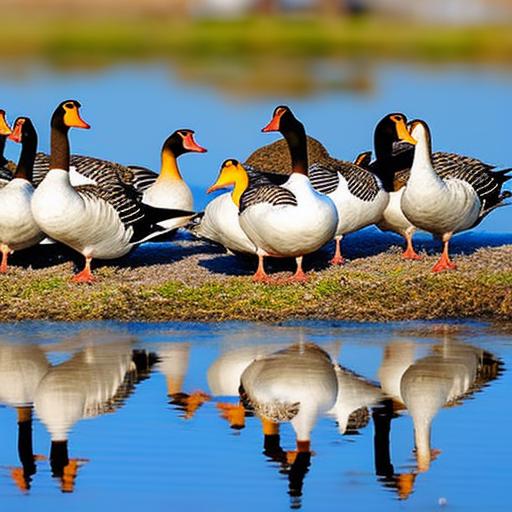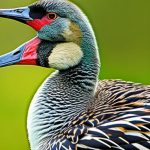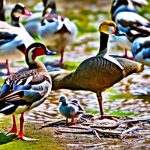Geese herding is a fascinating and rewarding activity that has been practiced for centuries. It involves the use of geese to guide and control other animals, such as sheep or cattle, in a specific direction. While geese herding may seem like a niche hobby, it is important for beginners to understand the basics in order to have a successful and enjoyable experience.
Key Takeaways
- Geese herding involves using trained geese to move and control other animals or people.
- Keeping geese for herding purposes can provide benefits such as natural pest control and reduced labor costs.
- Choosing the right breed of geese for herding depends on factors such as temperament and size.
- Creating an ideal living environment for herding geese involves providing adequate space, shelter, and access to water.
- Training geese for herding requires patience, consistency, and positive reinforcement.
Understanding the Basics of Geese Herding: A Beginner’s Guide
Geese herding can be defined as the practice of using geese to guide and control other animals. This technique has been used for centuries and has its roots in ancient civilizations such as Egypt and Rome. Geese are natural herders and have a strong instinct to protect their flock, making them ideal for this type of work.
The basic principles of geese herding involve training the geese to respond to specific commands and cues. This can be done through positive reinforcement, such as rewards or treats, or through negative reinforcement, such as gentle nudges or redirection. It is important to establish a strong bond with the geese and to be patient and consistent in their training.
The Benefits of Keeping Geese for Herding Purposes
There are several advantages to using geese for herding purposes. Firstly, geese are highly intelligent animals with excellent problem-solving skills. They are able to quickly learn and adapt to new situations, making them effective herders. Additionally, geese have a strong instinct to protect their flock, which makes them natural leaders and guardians.
In comparison to other herding animals such as dogs or horses, geese are relatively low maintenance. They require less space, food, and grooming than other animals, making them a cost-effective option for herding purposes. Furthermore, geese are highly efficient grazers and can help control weeds and pests in pastures, reducing the need for chemical treatments.
From an economic perspective, geese herding can be a profitable venture. Geese can be trained to work in a variety of settings, including farms, vineyards, and golf courses. They can help reduce labor costs and increase productivity by efficiently moving animals from one location to another. Additionally, geese can be used for weed control and land management, further enhancing their economic value.
Choosing the Right Breeds for Your Herding Needs
When it comes to choosing the right breeds for geese herding, there are several factors to consider. Different breeds have different characteristics and temperaments, so it is important to choose a breed that is well-suited to your specific herding needs.
Some popular breeds for herding purposes include the Toulouse, Embden, and Chinese breeds. The Toulouse breed is known for its large size and calm temperament, making them ideal for working with larger animals such as cattle or horses. The Embden breed is highly adaptable and can work well in a variety of settings. The Chinese breed is known for its agility and speed, making them effective at herding smaller animals such as sheep or goats.
When choosing a breed, it is important to consider factors such as size, temperament, and adaptability. It is also important to choose a breed that is well-suited to your climate and environment. Some breeds may be more tolerant of extreme temperatures or have better resistance to common diseases.
Creating the Ideal Living Environment for Your Herding Geese
Creating the ideal living environment for your herding geese is essential for their health and well-being. Geese require adequate housing and outdoor space to thrive.
In terms of housing requirements, geese need a sheltered area that provides protection from the elements. This can be a simple structure such as a shed or barn, or it can be a more elaborate setup with individual nesting boxes and roosting perches. It is important to provide enough space for the geese to move around comfortably and to have access to fresh water and food.
Outdoor space considerations are also important for herding geese. Geese require access to a large, open area where they can graze and exercise. This can be a fenced-in pasture or a designated area within a larger property. It is important to ensure that the outdoor space is secure and free from potential hazards such as predators or toxic plants.
Tips for creating a safe and comfortable environment for your herding geese include providing ample shade and shelter, ensuring access to clean water at all times, and regularly cleaning and maintaining their living areas. It is also important to provide enrichment activities such as toys or puzzles to keep the geese mentally stimulated.
Training Your Geese: Tips and Techniques for Success

Training your geese is a crucial step in successful geese herding. It is important to establish a strong bond with your geese and to use positive reinforcement techniques to encourage desired behaviors.
Basic training techniques for geese herding include teaching the geese basic commands such as “come” or “stay.” This can be done through repetition and rewards, such as treats or praise. It is important to be patient and consistent in your training, as geese can take time to learn new commands.
Advanced training techniques for experienced handlers include teaching the geese more complex commands such as “left” or “right.” This can be done through the use of visual cues or hand signals. It is important to gradually increase the difficulty of the commands and to reward the geese for their progress.
It is also important to expose your geese to different environments and situations to help them become more adaptable and confident in their herding abilities. This can be done through regular outings or by introducing them to new animals or objects in a controlled setting.
The Importance of Proper Nutrition for Your Herding Geese
Proper nutrition is essential for the health and well-being of your herding geese. Geese have specific nutritional requirements that must be met in order for them to thrive.
In terms of feeding, geese require a balanced diet that includes a variety of foods. This can include grains, such as corn or wheat, as well as fresh fruits and vegetables. It is important to provide access to clean water at all times, as geese require a significant amount of water for digestion and overall health.
Feeding tips and recommendations for herding geese include providing a consistent feeding schedule, offering a variety of foods to ensure a balanced diet, and monitoring their intake to prevent overeating or obesity. It is also important to provide access to grit or small stones, as geese require these for proper digestion.
Common nutritional deficiencies in geese include vitamin and mineral deficiencies. It is important to provide supplements or fortified feeds to ensure that your geese are getting all the necessary nutrients. Regular veterinary check-ups can also help identify any potential nutritional deficiencies and provide appropriate treatment.
Health and Wellness Considerations for Your Herding Flock
Maintaining the health and wellness of your herding flock is essential for their overall well-being and productivity. Geese are generally hardy animals, but they can still be susceptible to certain health issues.
Common health issues in geese herding include respiratory infections, parasites, and foot problems. It is important to monitor your geese closely for any signs of illness or discomfort, such as coughing, sneezing, or lameness. Regular veterinary check-ups can help identify and treat any potential health issues before they become more serious.
Preventative measures for maintaining flock health include providing regular vaccinations, practicing good hygiene and sanitation practices, and monitoring the flock for any signs of illness or disease. It is also important to provide a clean and comfortable living environment for your geese, as this can help prevent the spread of disease.
Tips for identifying and treating illnesses in geese include observing their behavior and appearance for any changes, consulting with a veterinarian for a proper diagnosis, and following their recommended treatment plan. It is important to act quickly if you suspect that your geese are ill, as early intervention can greatly improve their chances of recovery.
Managing Your Herding Geese: From Reproduction to Retirement
Managing your herding geese involves several considerations, from breeding and raising goslings to providing retirement options for older geese.
Breeding considerations for herding geese include selecting compatible pairs, providing appropriate nesting areas, and ensuring proper nutrition and care during the breeding season. It is important to monitor the breeding process closely and to provide any necessary assistance or intervention if needed.
Raising goslings for herding purposes involves providing a safe and nurturing environment for the young geese. This can include providing a separate area or pen for the goslings, ensuring access to clean water and food, and monitoring their growth and development. It is important to gradually introduce the goslings to the rest of the flock once they are old enough, to ensure a smooth transition.
Retirement options for older geese can vary depending on individual circumstances. Some options include providing a separate area or pen for the older geese, reducing their workload or responsibilities, or finding them a suitable retirement home or sanctuary. It is important to consider the individual needs and preferences of each goose when making retirement arrangements.
Troubleshooting Common Issues in Geese Herding
Like any activity, geese herding can come with its fair share of challenges and problems. It is important to be prepared and equipped to address and resolve these issues in order to have a successful and enjoyable experience.
Common problems and challenges in geese herding include stubbornness or disobedience, aggression towards other animals or humans, and difficulty in controlling the geese. Tips for addressing and resolving these issues include using positive reinforcement techniques, seeking professional guidance or training, and being patient and consistent in your approach.
Resources for additional support and guidance in geese herding include books, online forums or communities, and local herding clubs or organizations. It is important to reach out to experienced handlers or experts for advice and assistance when needed.
The Future of Geese Herding: Advancements and Innovations in the Field
The field of geese herding is constantly evolving, with new advancements and innovations being made to improve efficiency and effectiveness. Emerging trends and technologies in geese herding include the use of GPS tracking devices to monitor and control the geese, the development of specialized training programs and techniques, and the use of drones or other remote-controlled devices to assist with herding.
There is also potential for growth and expansion in the geese herding industry. As more people become aware of the benefits and advantages of using geese for herding purposes, the demand for trained geese and experienced handlers is likely to increase. This presents opportunities for individuals to enter the field and contribute to its growth.
Exciting developments to look out for in the future include advancements in training techniques and technologies, the development of specialized breeds or strains of geese for herding purposes, and the integration of geese herding into other industries such as agriculture or land management.
In conclusion, geese herding is a fascinating and rewarding activity that requires a solid understanding of the basics. By understanding the history, principles, and benefits of geese herding, beginners can embark on a successful journey in this field. From choosing the right breeds to creating an ideal living environment, training your geese, ensuring proper nutrition and health care, managing your flock from reproduction to retirement, troubleshooting common issues, and staying informed about advancements in the field, geese herding offers a wealth of opportunities for both beginners and experienced handlers. So, whether you are just starting out or have years of experience, geese herding is a field that is worth exploring and sharing your knowledge and expertise with others.
If you’re interested in keeping geese herding, you may also find this article on Poultry Wizard helpful: “Can Geese Eat Chicken Feed?” It provides valuable insights into the dietary needs of geese and whether or not they can consume chicken feed. Understanding the nutritional requirements of your geese is crucial for their overall health and well-being. To learn more about this topic, check out the article here. Additionally, if you’re looking for ideas to enhance your chicken coop’s interior, Poultry Wizard offers another informative article titled “Chicken Coop Interior Ideas.” Discover creative ways to make your coop more comfortable and functional for your feathered friends by clicking here. Lastly, if you’re interested in providing a cozy nesting space for your chickens, don’t miss the article “Chicken Coop Nest Box” on Poultry Wizard. Learn about different nest box designs and how to create a suitable environment for your hens to lay their eggs. Read more about it here.
FAQs
What is geese herding?
Geese herding is the practice of keeping and managing a flock of geese for various purposes, such as egg and meat production, pest control, or as pets.
What are the benefits of keeping geese?
Keeping geese can provide a source of food, such as eggs and meat, as well as natural pest control for gardens and farms. They can also make good pets and provide entertainment.
What are some common breeds of geese?
Common breeds of geese include Toulouse, Embden, Chinese, African, and Canadian.
What do geese eat?
Geese are primarily herbivores and eat grass, grains, and other vegetation. They also require access to clean water for drinking and bathing.
How do you herd geese?
Geese can be herded by using trained dogs, fencing, or by simply guiding them with food or treats. It is important to establish a routine and consistent training to ensure successful herding.
What are some common health issues for geese?
Common health issues for geese include respiratory infections, parasites, and injuries from predators or accidents. It is important to provide proper nutrition, shelter, and veterinary care to prevent and treat these issues.
Can geese be aggressive?
Geese can be territorial and protective of their flock, which can lead to aggressive behavior towards humans or other animals. It is important to establish boundaries and respect their space to avoid confrontations.
Meet Walter, the feathered-friend fanatic of Florida! Nestled in the sunshine state, Walter struts through life with his feathered companions, clucking his way to happiness. With a coop that’s fancier than a five-star hotel, he’s the Don Juan of the chicken world. When he’s not teaching his hens to do the cha-cha, you’ll find him in a heated debate with his prized rooster, Sir Clucks-a-Lot. Walter’s poultry passion is no yolk; he’s the sunny-side-up guy you never knew you needed in your flock of friends!







